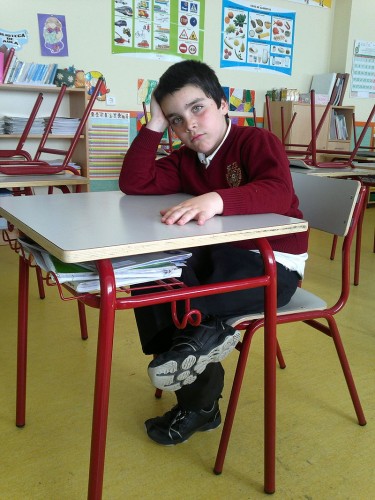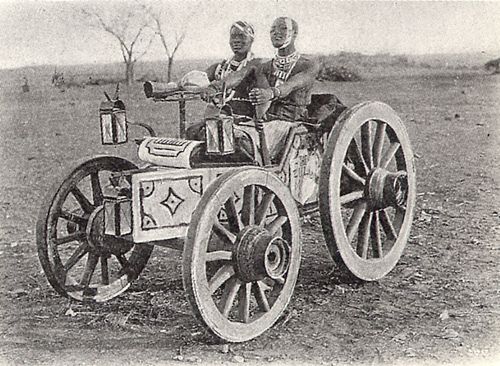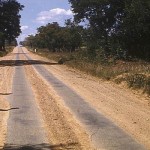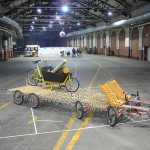A common argument made by proponents of degrowth, supported by historical evidence, is that economic growth is ecologically unsustainable and entails an increasing inequitable distribution of resources. In Tools for degrowth? Ivan Illich’s critique of technology revisited, Silja Samerski discusses Ivan Illich’s (1926-2002) argument that limits to growth are needed not only for ecological or distributive justice, but for social freedom. Any limits must be politically decided, and applied not primarily to the economy, but to technology. [Read more…]
Deschooling Society
Quoted from: Deschooling Society, Ivan Illich, 1972:
We cannot begin a reform of education unless we first understand that neither individual learning nor social equality can be enhanced by the ritual of schooling. We cannot go beyond the consumer society unless we first understand that obligatory public schools inevitably reproduce such a society, no matter what is thaught in them…
 School initiates the Myth of Unending Consumption. This modern myth is grounded in the belief that process inevitably produces something of value and, therefore, production necessarily produces demand. School teaches us that instruction produces learning. The existence of schools produces the demand for schooling. Once we have learned to need school, all our activities tend to take the shape of client relationships to other specialized institutions.
School initiates the Myth of Unending Consumption. This modern myth is grounded in the belief that process inevitably produces something of value and, therefore, production necessarily produces demand. School teaches us that instruction produces learning. The existence of schools produces the demand for schooling. Once we have learned to need school, all our activities tend to take the shape of client relationships to other specialized institutions.
Once the self-taught man or woman has been discredited, all nonprofessional activity is rendered suspect. In school we are thaught that valuable learning is the result of attendance; that the value of learning increases with the amount of input; and, finally, that this value can be measured and documented by grades and certificates.
In fact, learning is the human activity which least needs manipulation by others. Most learning is not the result of instruction. It is rather the result of unhampered participation in a meaningful setting. Most people learn best by being “with it”, yet school makes them identify their personal, cognitive growth with elaborate planning and manipulation.
Once a man or woman has accepted the need for school, he or she is easy prey for other institutions. Once young people have allowed their imaginations to be formed by curricular instruction, they are conditioned to institutional planning of every sort. “Instruction” smothers the horizon of their imagination.
Why Bicycles are Faster than Cars
“The model American male devotes more than 1,600 hours a year to his car. He sits in it while it goes and while it stands idling. He parks it and searches for it. He earns the money to put down on it and to meet the monthly installments. He works to pay for gasoline, tolls, insurance, taxes, and tickets. He spends four of his sixteen waking hours on the road or gathering his resources for it.”
“The model American puts in 1,600 hours to get 7,500 miles: less than five miles per hour. In countries deprived of a transportation industry, people manage to do the same, walking wherever they want to go, and they allocate only 3 to 8 per cent of their society’s time budget to traffic instead of 28 per cent. What distinguishes the traffic in rich countries from the traffic in poor countries is not more mileage per hour of life-time for the majority, but more hours of compulsory consumption of high doses of energy, packaged and unequally distributed by the transportation industry.”
“Man on a bicycle can go three or four times faster than the pedestrian, but uses five times less energy in the process. He carries one gram of his weight over a kilometer of flat road at an expense of only 0.15 calories. The bicycle is the perfect transducer to match man’s metabolic energy to the impedance of locomotion. Equipped with this tool, man outstrips the efficiency of not only all machines but all other animals as well. The bicycle lifted man’s auto-mobility into a new order, beyond which progress is theoretically not possible.”
“Bicycles are not only thermodynamically efficient, they are also cheap. With his much lower salary, the Chinese acquires his durable bicycle in a fraction of the working hours an American devotes to the purchase of his obsolescent car. The cost of public utilities needed to facilitate bicycle traffic versus the price of an infrastructure tailored to high speeds is proportionately even less than the price differential of the vehicles used in the two systems.”
Quoted form “Energy and Equity“, Ivan Illich, 1978. The image was found on the website Old Woodies. Previously: Cars, out of the way. More bicycle posts.






